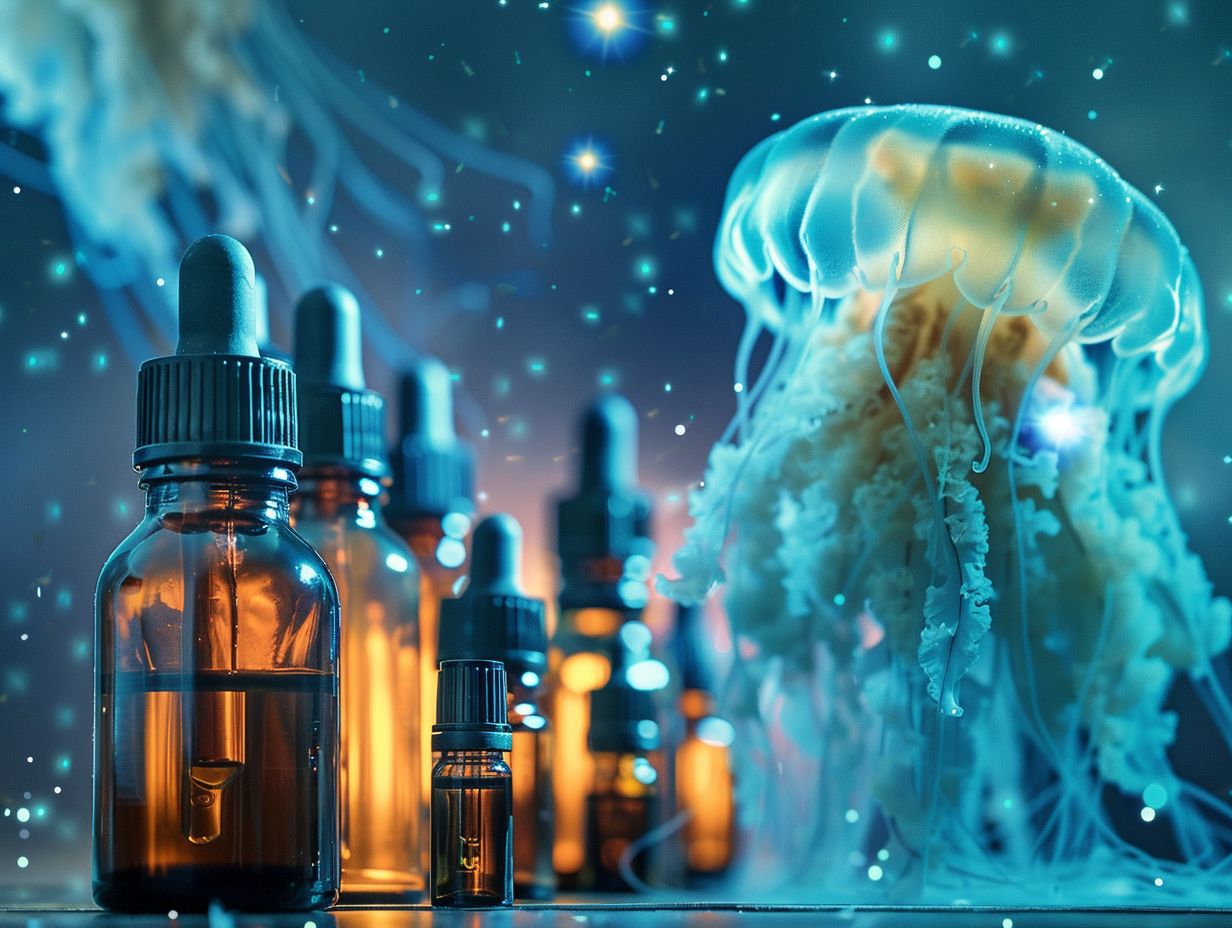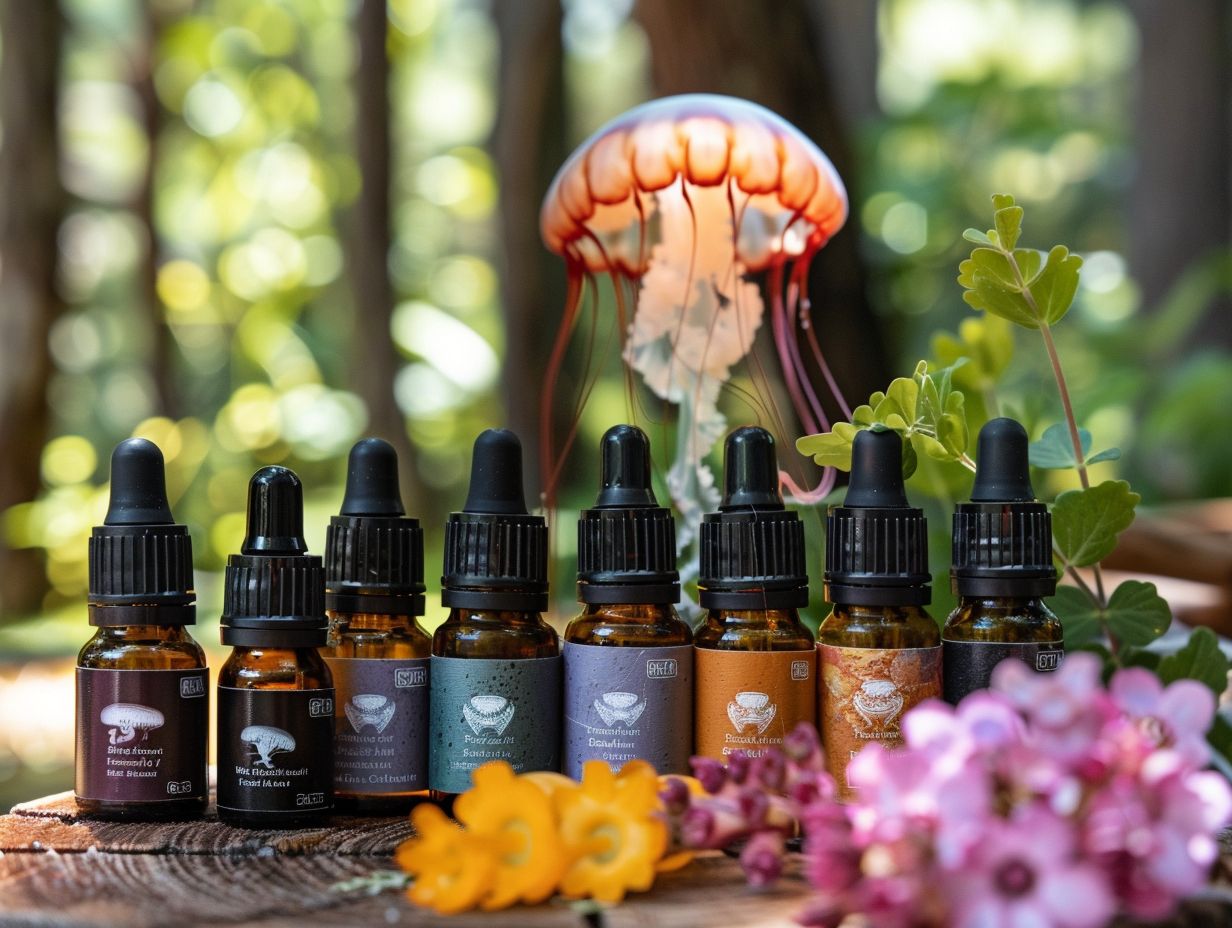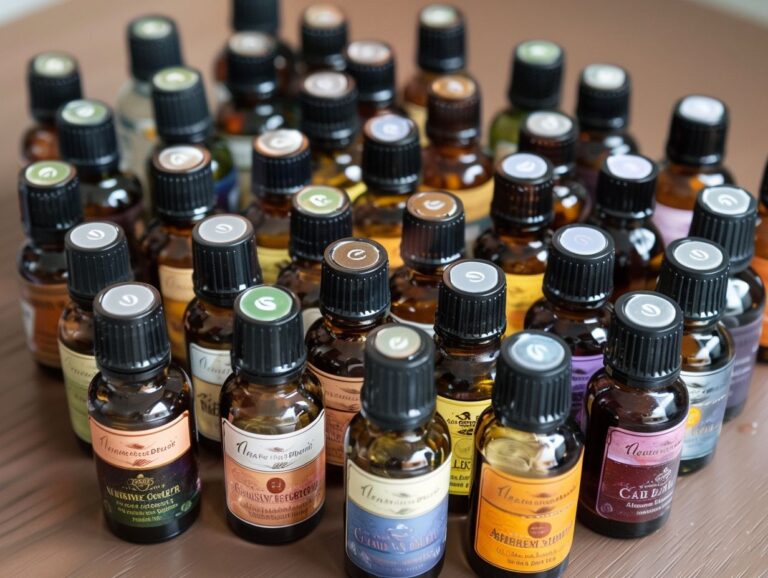What Essential Oils Are Good for Jellyfish Stings
Jellyfish stings can be painful and uncomfortable, but there are natural remedies that can help alleviate the symptoms. Essential oils have gained popularity for their ability to provide relief from jellyfish stings.
In this article, we will explore the best essential oils for treating jellyfish stings, how they work, and the different methods of application. We will also discuss possible side effects and when it is necessary to seek medical attention for a jellyfish sting.
Learn more about how essential oils can offer relief from this common beach hazard.
Key Takeaways:
What Are Jellyfish Stings?
Jellyfish stings occur when a person comes into contact with the tentacles of a jellyfish, leading to the injection of venom into the skin. The severity of the sting can vary based on the type of jellyfish and individual reaction.
Some of the common symptoms of jellyfish stings include intense pain, redness, swelling, and in severe cases, nausea and muscle cramps. It is crucial to seek immediate medical attention if someone is stung by a jellyfish, as certain species like the box jellyfish or Portuguese man-o-war can deliver potent and potentially lethal venom.
Delaying treatment can lead to complications such as allergic reactions, infection at the sting site, or even systemic symptoms affecting the heart and respiratory functions.
Quick and appropriate first aid measures, such as rinsing the area with vinegar or applying a hot water immersion, can help neutralize the venom and alleviate pain.
What Are the Symptoms of a Jellyfish Sting?
Common symptoms of a jellyfish sting include immediate pain, redness, swelling, and in some cases, a rash or welts at the site of contact. Severe reactions can lead to intense pain, difficulty breathing, and even allergic reactions.
As the sting progresses, individuals may experience increased swelling around the affected area, along with a burning sensation. The pain can radiate outward from the site of contact and intensify over time. In more severe cases, nausea, vomiting, muscle cramps, and headaches may develop. It is crucial to note that certain jellyfish species can cause systemic symptoms such as fever, chills, and a general feeling of illness.
What Essential Oils Can Be Used for Jellyfish Stings?
Essential oils such as lavender, tea tree, rosemary, and other natural remedies can provide relief from jellyfish stings by reducing pain and swelling. These oils are commonly used for various summer ailments like bug bites and sunburns.
One of the key benefits of lavender oil is its analgesic and anti-inflammatory properties, which can help soothe the discomfort and redness caused by jellyfish stings. Similarly, tea tree oil possesses antiseptic and anti-inflammatory qualities that aid in cleansing the affected area and reducing swelling. Rosemary oil is known for its pain-relieving and antispasmodic effects, making it a valuable ingredient for alleviating the sting’s sting and muscle cramps. When applied properly, these essential oils can provide quick relief and promote faster healing of jellyfish stings.
Lavender Oil
Lavender oil, known for its soothing properties, can help reduce pain and inflammation caused by jellyfish stings. The calming scent of lavender also promotes relaxation and can ease discomfort.
When applied to a jellyfish sting, lavender oil acts as a natural anti-inflammatory, reducing swelling and redness. Its analgesic properties help numb the affected area, providing relief from the stinging sensation. To apply lavender oil, mix a few drops with a carrier oil like coconut or almond oil, then gently dab the mixture onto the sting. This blend not only enhances the effectiveness of lavender oil but also moisturizes the skin.
Tea Tree Oil
Tea tree oil is a natural antiseptic that can help prevent infection in jellyfish stings. Its antimicrobial properties make it effective in reducing the risk of complications from the sting.
When a jellyfish sting occurs, it can introduce harmful bacteria or organisms into the skin, leading to potential infections. This is where the power of tea tree oil shines with its antiseptic qualities, it not only cleanses the affected area but also helps in warding off any bacteria that might cause infection. By applying a diluted solution of tea tree oil to the sting site, you create an environment that is inhospitable to pathogens, thereby promoting faster healing.
Peppermint Oil
Peppermint oil provides a cooling sensation that can help alleviate the burning sensation of jellyfish stings. Its refreshing aroma also helps in reducing discomfort and itching on the skin.
This natural remedy is known for its analgesic and anti-inflammatory properties that can efficiently calm the affected area. Peppermint oil contains menthol, which acts as a natural anesthetic, numbing the pain caused by the sting. Applying a diluted solution of peppermint oil can also aid in reducing swelling and redness, providing relief from the inflammation. When using peppermint oil for jellyfish stings, it is essential to mix it with a carrier oil like coconut or olive oil to prevent skin irritation. Gently massage the diluted mixture onto the affected area to promote absorption and maximize its soothing effects.
Eucalyptus Oil
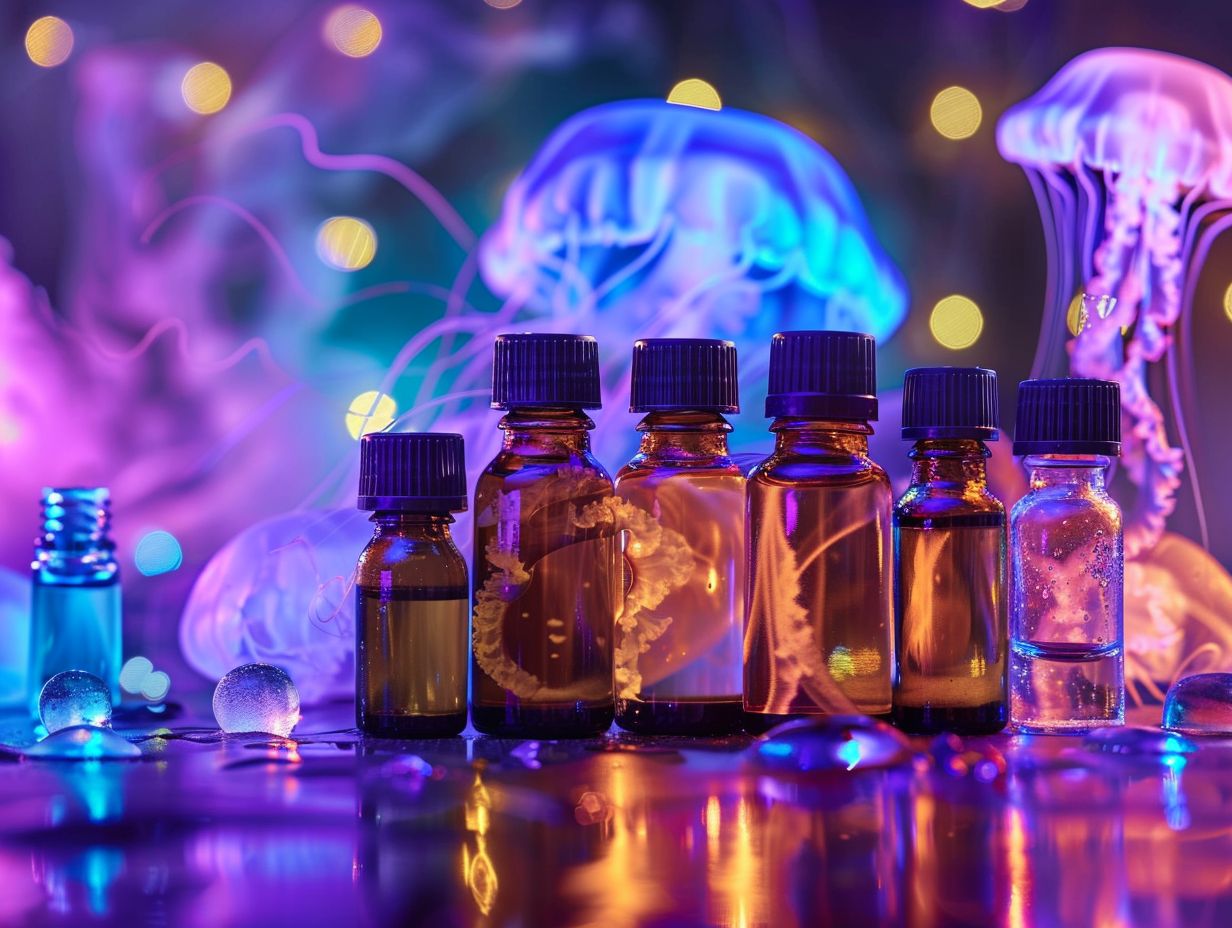
When dealing with a jellyfish sting, applying eucalyptus oil to the affected area can help alleviate discomfort and speed up the healing process.
The oil works by reducing inflammation and soothing the skin, which in turn eases pain and itching.
Eucalyptus oil’s antimicrobial properties can prevent infection in the sting area, further aiding in the recovery process.
Chamomile Oil
Chamomile oil has soothing and anti-inflammatory properties that can help calm the skin and reduce irritation caused by jellyfish stings. Its gentle nature makes it suitable for sensitive skin.
In terms of soothing skin irritations, chamomile oil is a versatile and natural remedy that can offer quick relief. The anti-inflammatory effects of chamomile oil can help alleviate the redness and swelling associated with jellyfish stings, easing discomfort and promoting healing. Chamomile oil is known for its gentle nature, making it a safe option for individuals with sensitive skin prone to reactions.
Helichrysum Oil
Helichrysum oil is prized for its wound-healing properties and can aid in the repair of skin damaged by jellyfish stings. Its regenerative effects promote skin recovery and reduce scarring.
When applied topically, this essential oil penetrates deeply into the skin, stimulating cell regeneration and collagen production. The anti-inflammatory and antioxidant properties of helichrysum oil also help soothe the pain and irritation caused by jellyfish stings, accelerating the healing process.
The analgesic properties of helichrysum oil can provide relief from the discomfort associated with jellyfish stings. Regular application of this potent oil can not only speed up the healing of the affected skin but also prevent infection, ensuring a smoother recovery.
How Do Essential Oils Help with Jellyfish Stings?
Essential oils offer a multifaceted approach to alleviating jellyfish stings by providing anti-inflammatory, analgesic, antihistamine, and antimicrobial properties. These properties work synergistically to reduce pain, swelling, and the risk of infection.
One of the most popular essential oils for treating jellyfish stings is tea tree oil, renowned for its antiseptic and anti-inflammatory qualities. Along with alleviating pain and redness, tea tree oil helps prevent bacterial infections that could develop at the sting site.
Another beneficial essential oil for jellyfish stings is lavender oil, appreciated for its soothing and calming properties. Lavender oil not only relieves pain but also helps reduce itching and promotes the healing process by supporting skin regeneration.
Anti-inflammatory Properties
The anti-inflammatory properties of essential oils help reduce redness, swelling, and irritation caused by jellyfish stings. By calming the skin and soothing inflammation, these oils promote faster healing.
Essential oils offer a natural and gentle remedy for the discomfort following a jellyfish sting. When applied topically, these oils work by inhibiting the body’s inflammatory response, which often results in pain and discomfort.
- Lavender oil is well-known for its anti-inflammatory effects, helping to decrease redness and swelling.
- Tea tree oil is another popular choice due to its antiseptic properties, which can prevent infection in the affected area, further aiding in the healing process.
Analgesic Properties
Essential oils with analgesic properties help relieve pain and discomfort associated with jellyfish stings. By numbing the affected area and reducing nerve sensitivity, these oils provide instant relief.
The analgesic properties of essential oils make them a valuable natural remedy for managing the intense pain caused by jellyfish stings. Specifically, oils like lavender and peppermint are known for their soothing and pain-relieving effects. Lavender oil, with its calming aroma and anti-inflammatory properties, can help alleviate the discomfort and inflammation. Likewise, peppermint oil’s cooling sensation can provide a numbing effect, diminishing the pain sensation.
When using essential oils for jellyfish stings, it is crucial to dilute them properly to avoid skin irritation mix a few drops of the essential oil with a carrier oil like coconut or almond oil before application. Always perform a patch test on a small area of skin to check for any adverse reactions before using it on the sting site. Apply the diluted oil mixture gently on the affected area to experience the benefits of natural pain relief.
Antihistamine Properties
Essential oils with antihistamine properties help reduce allergic reactions and swelling caused by jellyfish stings. By inhibiting histamine release, these oils prevent excessive inflammation and swelling.
When a jellyfish sting occurs, the body’s immune response triggers the release of histamine, causing redness, itching, and swelling at the site of the sting. The antihistamine properties of certain essential oils, such as lavender, peppermint, and tea tree, can help counteract this reaction.
Lavender oil, for example, not only soothes the skin but also acts as a natural antihistamine, reducing the severity of the allergic response. Similarly, peppermint oil provides a cooling sensation and anti-inflammatory benefits, aiding in minimizing swelling. Utilizing these oils topically can offer relief and promote faster healing from jellyfish stings.
Antimicrobial Properties
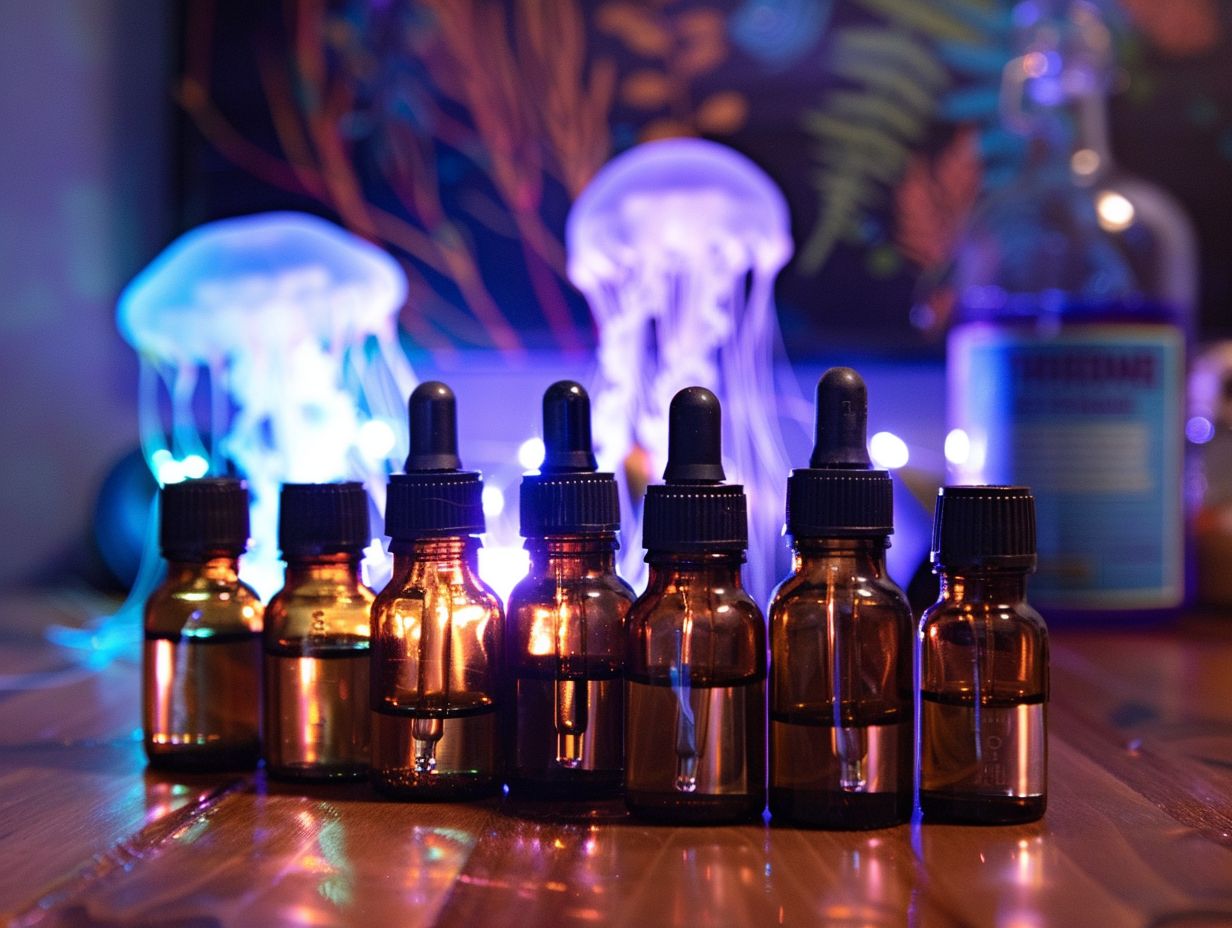
Essential oils with antimicrobial properties help prevent infection in jellyfish stings by inhibiting the growth of harmful bacteria. These oils promote a clean and sterile environment for the wound to heal.
Along with their antimicrobial effects, essential oils possess anti-inflammatory properties that can alleviate pain and reduce swelling associated with jellyfish stings. Tea tree oil and lavender oil are particularly effective in soothing the skin and accelerating the healing process due to their antiseptic and analgesic properties.
How to Use Essential Oils for Jellyfish Stings?
Essential oils can be used for jellyfish stings through topical application, inhalation, and in some cases, internal consumption. Each method offers unique benefits in alleviating pain and promoting healing.
When using essential oils topically for jellyfish stings, it is essential to dilute the oil with a carrier base such as coconut oil or olive oil to prevent skin irritation. Apply a few drops of lavender or tea tree oil directly to the affected area to reduce inflammation and soothe the skin.
Inhaling essential oils like eucalyptus or peppermint can help with respiratory symptoms caused by jellyfish stings. Simply add a few drops to a diffuser or inhale the scent directly from the bottle to clear nasal passages and ease breathing.
Internal consumption of essential oils for jellyfish stings should only be done under the guidance of a certified aromatherapist. Oils like chamomile or ginger can be added to warm water or tea to aid in reducing pain and inflammation internally.
Topical Application
Topical application of essential oils like lavender, tea tree, and rosemary directly to the affected area can help reduce pain and inflammation from jellyfish stings. Diluting the oils with a carrier oil is recommended for sensitive skin.
When selecting a carrier oil, opt for options like coconut oil or almond oil, which are gentle on the skin and enhance the efficacy of the essential oils. To prepare the mixture, combine a few drops of the chosen essential oil with a tablespoon of the carrier oil.
Applying the diluted essential oil blend to the sting site, gently massage the area in a circular motion to promote absorption and circulation. This helps in quicker relief and soothes the affected skin.
For optimal results, reapply the diluted mixture every few hours as needed, depending on the severity of the sting. Consistency in application is key to maximizing the benefits of the essential oils in alleviating discomfort.
Inhalation
Inhalation of essential oils like eucalyptus and peppermint can help ease respiratory symptoms and provide a calming effect during jellyfish stings. Using a diffuser or steam inhalation can enhance the benefits.
Essential oils have been utilized for centuries for their therapeutic properties, offering a natural remedy for various health issues. When inhaled, the aromatic compounds from these oils can directly impact the respiratory system, aiding in relieving congestion and promoting easier breathing.
- Eucalyptus oil is renowned for its decongestant and expectorant properties, making it a top choice for respiratory support. Its invigorating scent is known to clear nasal passages and soothe irritation caused by jellyfish stings.
- Similarly, peppermint oil is not only refreshing but also acts as a natural antispasmodic, helping to relax the airways and alleviate coughing triggered by the sting.
Whether through a diffuser dispersing the oils into the air or steam inhalation allowing direct absorption, these methods can effectively deliver the benefits of the essential oils for quicker relief and a sense of well-being.
Internal Consumption
Internal consumption of essential oils like chamomile and helichrysum may offer systemic benefits for overall healing from jellyfish stings. It is crucial to consult a healthcare professional before ingesting oils.
When considering the ingestion of essential oils for jellyfish stings, it’s important to remember that not all oils are safe for internal use, and incorrect dosages can pose serious health risks. Seeking guidance from a medical expert ensures that the oils are suitable for ingestion and that the dosage is appropriate for your individual needs.
Furthermore, some essential oils can interact with medications or existing health conditions, highlighting the necessity of professional advice. Adhering to safe practices and expert recommendations can maximize the potential benefits while minimizing any potential risks associated with consuming essential oils internally.
Are There Any Side Effects of Using Essential Oils for Jellyfish Stings?
While essential oils are generally safe for treating jellyfish stings, some individuals may experience skin irritation, allergic reactions, or sensitivities to specific oils like lavender or peppermint. Patch testing is recommended before widespread use.
It is crucial to properly dilute essential oils before applying them to the skin, as using them undiluted can lead to further irritation. It is important to be aware of any pre-existing skin conditions or sensitivities that may interact negatively with certain oils.
- Always read and follow the instructions provided by the manufacturer to ensure safe usage.
- Look for any signs of an allergic reaction, such as redness, itching, or swelling, and discontinue use immediately if any adverse effects occur.
When to Seek Medical Attention for a Jellyfish Sting?
Medical attention for a jellyfish sting should be sought if the individual experiences severe pain, difficulty breathing, chest tightness, dizziness, or signs of an allergic reaction such as hives or swelling. Contacting emergency services or visiting a medical facility, such as the Red Cross, may be necessary for prompt treatment.
Seek immediate medical help if the sting victim shows symptoms like rapid heartbeat, nausea, vomiting, muscle weakness, or fainting after a jellyfish encounter. These indications could signal a severe reaction that requires urgent attention. Remember, delaying seeking medical care in such cases can lead to further complications. Quality healthcare facilities like hospitals with specialized emergency departments or local urgent care centers are equipped to handle jellyfish stings effectively. It’s essential to act swiftly in such situations to prevent any potential hazards.
Frequently Asked Questions
What essential oils are good for jellyfish stings?
Some essential oils that are known to be effective for jellyfish stings include tea tree oil, lavender oil, peppermint oil, eucalyptus oil, and chamomile oil.
How do these essential oils help with jellyfish stings?
These essential oils contain anti-inflammatory, analgesic, and antiseptic properties which can help reduce pain, swelling, and prevent infection.
Can I apply essential oils directly on the jellyfish sting?
No, it is not recommended to apply essential oils directly on the sting as it may cause further irritation. It is best to dilute the essential oils with a carrier oil before applying it on the affected area.
Which essential oil is the best for immediate relief from a jellyfish sting?
Peppermint oil is known to provide immediate relief from the pain and burning sensation caused by jellyfish stings. Its cooling properties can help soothe the sting and reduce discomfort.
Are there any precautions to take when using essential oils for jellyfish stings?
Yes, it is important to do a patch test before applying any essential oil on the affected area to make sure you are not allergic to it. Also, avoid using essential oils on open wounds or broken skin.
Can essential oils be used as a preventive measure against jellyfish stings?
While essential oils can provide relief from the symptoms of jellyfish stings, they cannot prevent stings from occurring. It is important to take precautions such as wearing protective clothing and avoiding known jellyfish habitats to prevent stings.

